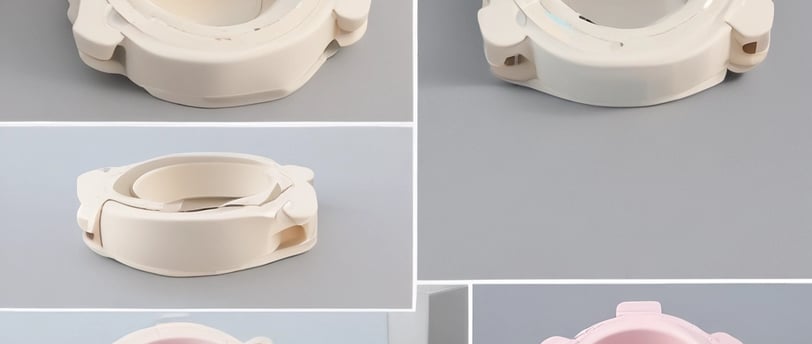On-the-Go Comfort for Little Travelers
2/27/20254 min read


Understanding the Challenges of Potty Training
Potty training is a significant milestone in a child's development, yet it is often perceived as a daunting task for many parents. The process typically involves several challenges that can induce stress and frustration. One of the primary hurdles is resistance from children. Youngsters may exhibit reluctance to transition from diapers to a potty seat, which can stem from various reasons, including comfort with the familiar and fear of change. This resistance can manifest in refusal to use the potty, making the journey more complex for parents.
Accidents are another prevalent challenge during this phase. It is common for children to have occasional mishaps, which can create anxiety for both the child and the parent. Understanding that these incidents are a part of the learning process is essential. With a patient approach, parents can help alleviate the associated pressure and encourage their children to persevere, reinforcing that accidents are normal and part of developing new skills.
The psychological burden often faced by parents cannot be overlooked. Many parents feel compelled to conform to societal expectations regarding the timing of potty training, which may lead to heightened stress. It is crucial for parents to recognize that every child is unique and develops at their own pace. Fostering a supportive environment where children feel safe to explore their readiness can facilitate a more positive experience.
Despite the challenges, successful potty training has numerous benefits. Achieving this milestone fosters a sense of independence in children, empowering them to take control of their bodies and personal hygiene. Additionally, it results in significant cost savings on diapers and related products. By approaching potty training with understanding and patience, parents can turn this potentially tumultuous experience into a rewarding adventure for both themselves and their children.
The Fold-and-Go Potty Seat is a remarkable innovation designed to simplify the process of potty training for families. This versatile potty seat fits securely on standard toilets, ensuring a stable and comfortable platform for children venturing into this new stage of independence. One of its standout features is its portability; the Fold-and-Go design allows the seat to be compactly folded and easily stored or transported, making it an essential travel companion for families on the move.
Constructed from durable, child-safe materials, the Fold-and-Go Potty Seat prioritizes both safety and comfort. Its lightweight construction doesn’t compromise its strength, allowing children to sit securely without the risk of slipping. The anti-slip surface and edges ensure that the seat remains stable on the toilet while in use, providing peace of mind to parents as their children learn to navigate this transitional process.
Another significant advantage of the Fold-and-Go Potty Seat is the ease of cleaning it offers. Made from materials that are not only durable but also easy to wipe down and sanitize, parents will find that maintaining hygiene is straightforward—essential for any potty training journey. This feature alleviates concerns about messes during the training phase, allowing for a more relaxed experience overall.
The design of the Fold-and-Go enhances a child's confidence and sense of security during potty training. With a familiar, supportive surface beneath them, children are more likely to embrace this important rite of passage. In turn, this encourages consistency in training routines, which can lead to quicker success rates compared to using public restrooms without adequate accommodations. Ultimately, the Fold-and-Go Potty Seat transforms what can be a challenging experience into a manageable and even enjoyable adventure for both parents and children alike.
Encouragement and Motivation: Turning Minors into Triumphs
Potty training represents a significant milestone in a child's development, and encouraging children during this journey is essential for fostering a sense of achievement and confidence. One of the most effective strategies for encouraging children is through positive reinforcement. When a child successfully uses the potty, immediate praise can reinforce the behavior, making them more likely to repeat it in the future. Simple affirmations like “Great job!” or “I’m so proud of you!” can boost a child's self-esteem, signaling that they are on the right path.
Celebrating successes, no matter how small, is equally important. Parents can create a fun atmosphere by implementing reward charts. As children engage with the Fold-and-Go Potty Seat, they can add stickers to a chart for each successful attempt, providing a visual representation of their progress. The excitement of placing a sticker can serve as an additional motivation, turning the potty training process into an enjoyable game, rather than a chore.
Moreover, incorporating small incentives can further enhance motivation. Simple rewards, like a favorite snack or an extra story at bedtime, can make a significant difference in encouraging children to embrace their potty training experience. Such external motivators not only create a positive potty training environment but also promote a sense of accomplishment.
Insights from pediatric experts indicate that emotional support plays a critical role in this transition. Acknowledging a child’s feelings about potty training—whether it be excitement, fear, or frustration, allows for open communication. Offering comfort and understanding helps children feel secure, empowering them to approach potty training with a more positive outlook. A supportive environment, supported by the innovative use of the Fold-and-Go Potty Seat, can transform potty training from a daunting task into an adventurous and rewarding experience.
Tips for a Smooth Potty Training Transition
Potty training can be a significant milestone for both parents and children, and successfully navigating this transition requires preparation and patience. One of the essential tips is to recognize the ideal time to start potty training. Signs such as showing interest in the toilet, staying dry for longer periods, or communicating the need to go can indicate readiness. It is crucial to choose a time when the child is not experiencing major life changes, such as a new sibling or moving to a new home.
When preparing to transition, having the right tools, such as the Fold-and-Go Potty Seat, can facilitate this journey, especially during outings. Parents should practice using the seat at home first to familiarize their child with it, then carry it along for trips outside. Additionally, packing essential items, such as wipes and a change of clothes, can help manage potential accidents. It is also helpful to establish a routine, encouraging regular bathroom visits to build confidence and reinforce habits.
Accidents are a natural part of the potty training process, and handling them gracefully is essential. Instead of reacting negatively, calmly reassure the child that mistakes are okay and encourage them to try again. Creating a positive atmosphere around potty training can alleviate fears or anxieties. Celebrating small successes and engaging in positive reinforcement, such as praise or reward charts, can further motivate the child.
Finally, be consistent in maintaining a routine at home. Providing a supportive and stress-free environment will help the child feel more comfortable with their progress. By following these tips, parents can empower themselves and their little ones, making the journey of potty training a more pleasant experience for everyone involved.
